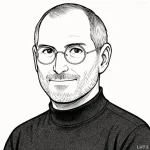“I think the brain is essentially a computer and consciousness is like a computer program. It will cease to run when the computer is turned off. Theoretically, it could be re-created on a neural network, but that would be very difficult, as it would require all one’s memories.”

- January 8, 1942 – March 14, 2018
- British
- Theoretical physicist, science writer
table of contents
Quote
“I think the brain is essentially a computer and consciousness is like a computer program. It will cease to run when the computer is turned off. Theoretically, it could be re-created on a neural network, but that would be very difficult, as it would require all one’s memories.”
Explanation
In this quote, Stephen Hawking draws an analogy between the brain and a computer, suggesting that consciousness operates similarly to a computer program—a set of processes running on hardware. According to this view, when the “computer” (the brain) is turned off (when we die), the “program” (consciousness) ceases to function. Hawking suggests that while it might be theoretically possible to recreate consciousness on a neural network (a type of computer system modeled on the structure of the brain), doing so would be incredibly complex. It would require capturing not just the brain’s structure, but also the entire repository of an individual’s memories, which are key to personal identity and conscious experience.
This analogy reflects a broader philosophical and scientific inquiry into the nature of consciousness and identity. It poses the question of whether consciousness is a product of purely biological processes or if it can be replicated or even transferred into artificial systems. The idea that consciousness could be recreated on a neural network suggests the possibility of mind uploading or digital immortality—concepts that have fascinated both scientists and futurists. However, as Hawking points out, the difficulty lies in not just mimicking the neural processes but also accurately preserving the memory and experiential aspects of a person’s consciousness, which are integral to self-awareness and continuity of identity.
This quote also reflects Hawking’s ongoing exploration of the intersection between biology and technology, and his interest in how advances in computing and artificial intelligence could impact our understanding of human nature. While Hawking did not delve deeply into the concept of mind uploading in the same way as some futurists, his statement acknowledges both the potential and the complexity of these ideas. By framing consciousness as a “program” running on the “hardware” of the brain, he encourages us to think about the nature of self-awareness and what it means to be human in a world where technology continues to blur the lines between the biological and the artificial.
Would you like to share your impressions or related stories about this quote in the comments section?

